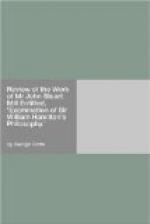The doctrine of Relativity, as held by Kant and his many followers, is next distinguished from the same doctrine as held by Hartley, James Mill, Professor Bain, &c., compatible with either acceptance or rejection of the Berkeleian theory. Kant maintains that the attributes which we ascribe to outward things, or which are inseparable from them in thought, contain additional elements over and above sensations plus an unknowable cause—additional elements added by the mind itself, and therefore still only relative, but constituting the original furniture of the mind itself—inherent laws, partly of our sensitive, partly of our intellectual faculty. It is on this latter point that Hartley and those going along with him diverge. Admitting the same additional elements, these philosophers do not ascribe to the mind any innate forms to account for them, but hold that place, extension, substance, cause, and the rest, &c., are conceptions put together out of ideas of sensation, by the known laws of Association—(pp. 12—14).
Partial Relativity is the opinion professed by most philosophers (and by most persons who do not philosophize). They hold that we know things partly as they are in themselves, partly as they are merely in relation to us.
This discrimination of the various schools of philosophers is highly instructive, and is given with the full perspicuity belonging to Mr Mill’s style. He proceeds to examine in what sense Sir W. Hamilton maintained the Relativity of Human Knowledge. He cites passages both from the ‘Discussions on Philosophy’ and from the Lectures, in which that doctrine is both affirmed in its greatest amplitude, and enunciated in the most emphatic language—(pp. 17, 18, 22, 23). But he also produces extracts from the most elaborate of Sir W. Hamilton’s ‘Dissertations on Reid,’ in which a doctrine quite different and inconsistent is proclaimed—that our knowledge is only partially, not wholly, relative; that the secondary qualities of matter, indeed, are known to us only relatively, but that the primary qualities are known to us as they are in themselves, or as they exist objectively, and that they may be even evolved by demonstration a priori—(pp. 19-26, 30). The inconsistency between the two doctrines, professed at different times, and in different works, by Sir W. Hamilton, is certainly manifest. Mr Mill is of opinion that one of the two must be taken ’in a non-natural sense,’ and that Sir W. Hamilton either did not hold, or had ceased to hold, the doctrine of the full relativity of knowledge (pp. 20-28)—the hypothesis of a flat contradiction being in his view inadmissible. But we think it at least equally possible that Sir W. Hamilton held both the two opinions in their natural sense, and enforced both of them at different times by argument; his attention never having been called to the contradiction between them. That such forgetfulness was quite possible, will appear clearly in many parts of the present article. His argument in support of both is equally characterized by that peculiar energy of style which is frequent with him, and which no way resembles the qualifying refinements of one struggling to keep clear of a perceived contradiction.




